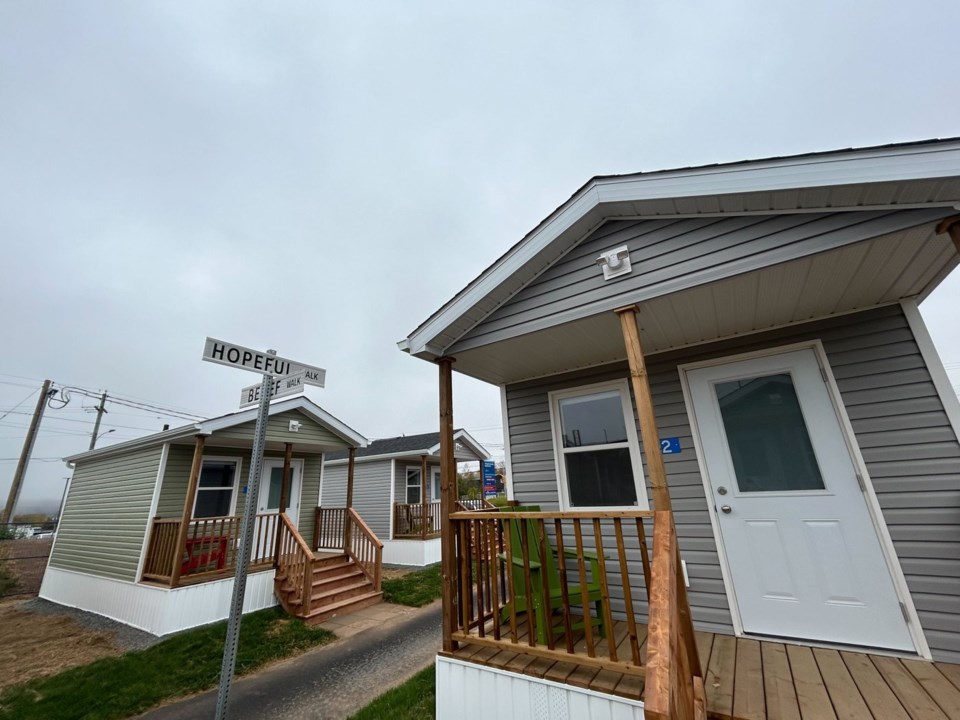HALIFAX — About 20 kilometres northwest of downtown Halifax, at the corner of Hopeful and Belief, lie rows of tiny homes, each with their own brightly coloured porch chair, waiting for their first occupants.
The new neighbourhood is Nova Scotia's latest project to address homelessness, particularly in the province's biggest city, where as of mid-October almost 1,300 people described themselves as unhoused, according to a local community group.
On Thursday, standing in the morning fog in front of a tiny home, Suzanne Ley with Nova Scotia’s Department of Community Services said the goal of the project is to offer homeless people a temporary accommodation resembling more of a “traditional home.”
“They’re meant to be a stop along the path towards independence, a safe and dignified place for people to come inside,” Ley said after a tour of the soon-to-be-opened tiny home village in Lower Sackville N.S., a suburb of Halifax.
The homes are miniature versions of the type of house seen in suburban areas, with gable roofs and wooden porches. The narrow paths that line the community have names such as Hopeful Walk and Belief Walk, mimicking streets. The first 26 single-occupancy and four double-occupancy units will open on Nov. 4, and the expected completion date for the rest of the homes is in December. Once complete, the village will house up to 70 people in 60 single- and double-occupancy homes.
Single units are 176 square feet; double-occupancy units are 252 square feet. They come self-contained and fully furnished: each home has a kitchen equipped with a cooktop, small fridge and microwave, as well as a private bathroom and shower.
The tiny home community is a product of a partnership between the province, the Halifax Regional Municipality, United Way Halifax, The Shaw Group and Dexter Construction. The city donated the land for the village, while the United Way Halifax owns the units and will coordinate the necessary property management. The province put up $9.4 million in construction costs last fall to build the homes and has committed $935,000 annually for operational costs.
Residents of the tiny homes are chosen from a list of people experiencing homelessness that is maintained by the Affordable Housing Association of Nova Scotia. The non-profit refers people to the province’s Department of Community Services for a space in one of the homes. A spokesperson for the province said residents for the first phase have already been chosen.
Joe Rudderham, executive director of Atlantic Community Shelters Society, said the tiny homes are unlike Pallet shelters — the 70-square-foot fibreglass structures that were installed in the Halifax area and Kentville, N.S., earlier this year to offer homeless people transitional spaces that are “basically a place to sleep, to sit at a desk, and a place to store some stuff."
In Lower Sackville's village, he said, all utilities are included for residents, who will also get access to bedding and towels for their homes. Shared computers, office spaces and laundry facilities are also on site.
Residents living in the units will pay rent that is capped at 30 per cent of their income, whether that be through employment earnings, or support from government programs such as employment insurance, income assistance, or disability supports.
In addition to self-contained units, Rudderham's group will also provide support to residents to help them get on the path to permanent stability. Rudderham said the supports available will depend on what the village residents need, but he expects his group to provide counselling and mental health supports, employment services to help residents with resumes or interview coaching, or educational services such cooking and budgeting lessons.
This report by The Canadian Press was first published Oct. 24, 2024.
Cassidy McMackon, The Canadian Press



